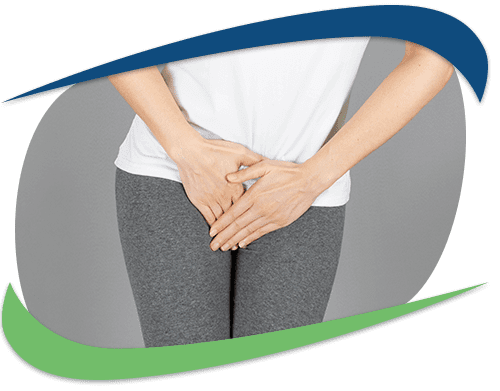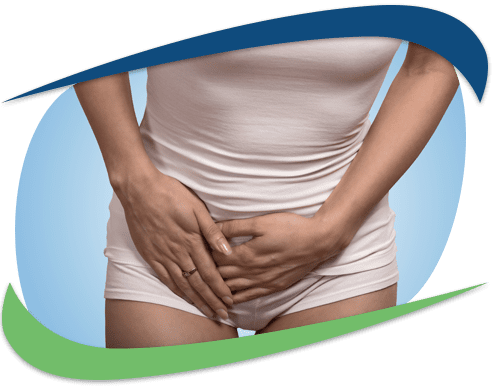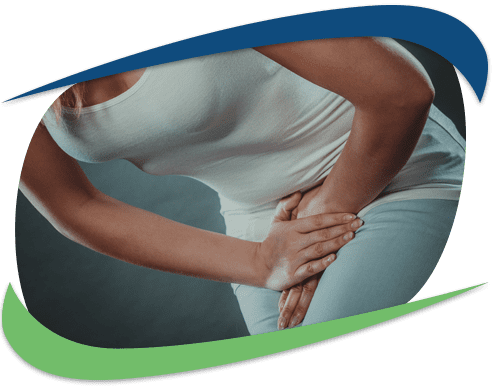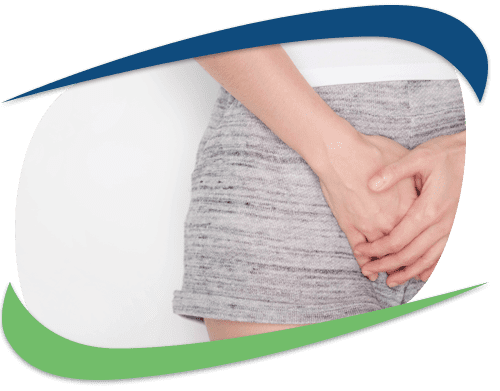Bladder Issues
STRESS INCONTINENCE:
Do you leak when you cough, sneeze, laugh, jump, run or go on the trampoline?
Stress incontinence is more common in women than men and is mainly caused by weakness of the pelvic floor but in some cases, it may be caused by overactivity of the pelvic floor muscles. Note it is common, but not normal. You should never leak, not even a little bit.
Stress incontinence may occur due to pregnancy and childbirth (especially if you have had an assisted pregnancy or multiple pregnancies), chronic straining on the toilet or a chronic cough. We would most commonly see women attend following childbirth or after menopause. The first thing we do is to check that you can do a pelvic floor contraction correctly (50% of women can’t) and then we will give you a programme to get the muscles back working again. This will involve a home exercise programme or we may use biofeedback or a muscle stimulator.
OVERACTIVE BLADDER:
- Do you have to rush to get to the toilet on time?
- Do you sometimes not get there on time?
- Do you go more than seven times a day?
- Do you get up more than once a night to go to the toilet?
- Do you know where every toilet in town is?
- Do you get the urge to pee when you put the key in the door?
These are all signs of an overactive bladder and happen when there are involuntary contractions of the bladder muscle. In other words, the bladder muscle contracts to empty your bladder at a time when it is not convenient and you can’t switch off the sensation in the way you previously could. If the contraction is very strong, it may squeeze out some urine on the way to the toilet. The leaks with an overactive bladder tend to be quite large.
People with overactive bladders often empty their bladder ‘just in case’ so go to the toilet more than seven times a day (four to seven times is normal). Caffeine can exacerbate the issue as it acts as a bladder muscle stimulant.
Treatment for an overactive bladder will always start with a bladder training programme. We may ask you to fill out a bladder chart so we (and you) get the full picture of what is happening. It is important to strengthen the pelvic floor muscles if they are weak as they can help you hold on. We will advise on caffeine and other fluid intake. We may advise that you use a muscle stimulator. Medications can be helpful in some cases and we will refer you to your G.P. if we think that would be appropriate.
If you have any of the above symptoms, please make an appointment to see Linda FitzGerald so she can help you get dry.
Useful Links:
www.iuga.org – lots of patient information leaflets
www.continence.ie – Continence Foundation of Ireland
Prolapse
A prolapse is when one of the pelvic organs (bladder, bowel or uterus) bulges into the vaginal space.
It happens when the muscles and other tissues that are designed to give support are weakened. Symptoms are often described as discomfort, a dragging sensation or heaviness and sometimes the bulge may be visible. The main causes are childbirth, chronic straining on the toilet due to constipation and having a chronic cough. Being overweight doesn’t help. There may be a familial disposition to prolapse due to genetic tissue type.
Physiotherapy treatment involves improving the strength and endurance of the pelvic floor muscles that support the pelvic organs. We will also give advice on avoiding putting pressure on the pelvic floor, how to avoid straining and how to protect the pelvic floor when coughing. We may suggest using a muscle stimulator and can advise on certain types of pessary.
Pelvic Pain in Women
Pelvic girdle pain usually refers to pain in the pelvic area during pregnancy but it can occur at any time. Vaginismus is a condition caused by spasm of the pelvic floor muscles. Vulvodynia is pain in the external genitalia and dyspareunia is pain during or after intercourse.
There are many causes such as having overactive pelvic floor muscles, pregnancy, mesh surgery, endometriosis, haemorrhoids, fissures, scarring and nerve damage. It is important that you are fully assessed to ascertain the cause or causes of the pain.
Treatment will usually consist of:
- training the pelvic floor muscles (maybe strengthening, maybe downtraining them if they are overactive)
- strengthening hip and tummy muscles
- soft tissue techniques
- defaecation techniques
- scar mobilisations
- biofeedback
- muscle stimulation
- advice
So help is available. Make an appointment to see Linda if you are suffering from pelvic pain.
Bowel Issues in Women
Many women suffer from bowel leakage but they often suffer quietly. Childbirth is the most common cause and it mainly happens after having a third or fourth degree tear or if the pudendal nerve has been damaged. Other causes are chronic constipation, haemorrhoids, being overweight or having a chronic cough.
Tummy problems such as I.B.S. can cause leakage if you have the combination of a loose stool and a weak sphincter muscle.
Linda specialises in treating bowel issues and she will first take a full history of any bowel and bladder symptoms, medications, gynae and obstetric history, fluid and food intake, toilet habits, general health and exercise that you do. This first part is usually done via a phone consultation.
Treatment can include:
- pelvic floor strengthening using exercises or muscle stimulation
- defaecation techniques
- biofeedback
- soft tissue therapy
- nerve mobilisations
- advice
Make an appointment to see Linda. You can book a women’s health appointment online or by calling 018352043.
USEFUL LINKS WITH HANDOUTS:
www.continence.ie
www.iuga.org




